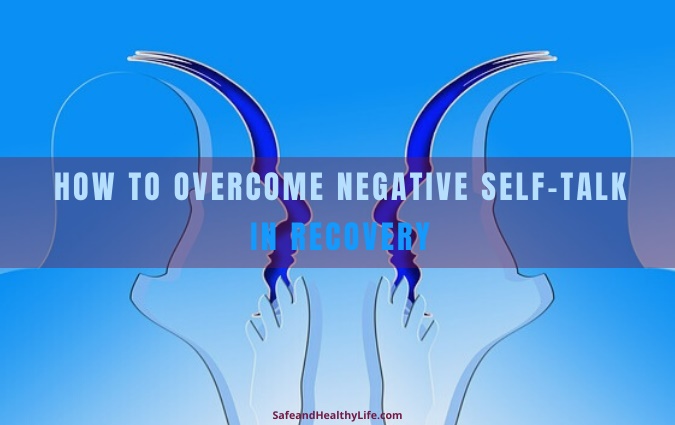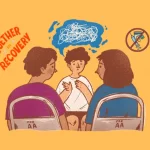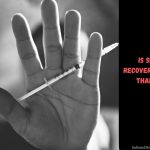
Do you know what would have been nice and simple?
Say, the body of this post only contains a sentence – “Overcome your negative self-talk in recovery by inculcating the habit of positive self-talk.” But well, we all know that overcoming negative self-talk is not as easy as closing a bottle of jam. I think I am done with this, time to place the lid on it.
First off, we need to understand what we are dealing with.
What is negative self-talk?
We all have that part of our subconscious, which we are always in communication with.
That tiny voice that says you deserve to celebrate when you have accomplished something remarkable. The same voice that holds a debate with you when you are about to do something wrong.
There are times when this subconscious part of you might adopt an ever-criticizing position on everything you do. No matter how much effort you put into being better and how good whatever you have done might be, it will always find a way to cast doubt on it.
It could also be that whenever you try to do something, your subconscious makes you think or believe that you will never be good at it. This inner voice of yours has now become extremely destructive.
Negative self-talk is the cynical subconscious conversation that you have with yourself. If not always, it is mostly focused on casting doubts on your abilities, finding room for blame on all your actions, and making all your plans look like some calamitous venture.
Hence, making it difficult to believe in yourself and make significant progress in your recovery.
There are numerous toxic effects of negative self-talk on an individual in recovery, some of which are:
- Persistent pessimism
- Depression
- Stress
- Perfectionism and setting unsurmountable goals
- Difficulties in seeing opportunities for what they are, and exploiting them
- Social reclusion and difficulty maintaining relationships
- Persistent doubt about oneself and others
- Projecting negativity on others
- Inexplicable bitterness
- A skewed perspective that sees more wrongs than goodness
- Trouble forgiving yourself for mistakes made in the past
These are some of the ways through which negative self-talk manifests and affects an individual. And as you can see, the toxicity of these effects is undeniable.
Therefore, it is crucial that you untangle yourself whenever you’re in this web of negativity.
How to overcome negative self-talk in recovery
Emotional stability is one of the most personally influencing propellants of successful addiction recovery. To take bold, steady steps on your journey to recovery, you will need to:
- Be in the right frame of mind.
- Understand that there are gray areas amidst the black-and-white perspectives on life.
- Shed your cloak of negative self-talk, and adorn yourself with more positivity – to create an emotional balance.
Consequently, you significantly boost your chances of long-term sobriety without a relapse. As an addict, medically-supervised drug detox is the surest first step toward long-term sobriety.
However, your mental state has a lot to do with how willing you will be to be steadfast on your journey to full recovery.
The toxic effects and manifestations of negative self-talk, as already mentioned, can disrupt your mental stability and plunge you toward relapse.
Thankfully, there are several things you can do on your own to overcome negative self-talk in recovery. Thus;
1. Be aware
A bird raised in a cage is more likely to think that the cage is all life is about until it gets released into the open.
If you have sunken deep into the quicksand of negative self-talk, you will likely have accepted negativity or a critical disposition as the norm in your life.
You have to acknowledge that truly, this is not how things are – there are lights of positivity in everything, and you need to let those lights shine bright.
Though negative self-talks are usually subconscious dialogues, anytime you feel yourself wallowing, you need to make yourself aware of the fact that your internal conversations are extremely negative. And that they are not a portrayal of reality.
By being self-aware, you will be able to significantly reduce the number of self-deprecating decisions you make based on negative self-talk.
2. Accept things for what they are

You don’t need to overthink things always or fixate on some non-existent narrative to apportion blame or self-doubt on yourself. Most times, things are just what they are – nothing else.
A task or goal can be naturally tough to accomplish, not because you are dumb or inept.
With some positivity and concerted effort, you might accomplish it. And if you are unable to get through it, it is not because you are a failure.
Some things just don’t work out as we expect.
3. Acknowledge that you won’t always be perfect
As a recovering addict, you might find yourself putting in a lot of work to make things right so that you can make up for your past mistakes.
In so doing, you might begin to edge towards perfectionism – a belief that you won’t accept anything that is impeccable. Eventually, when things come out less than perfect – even if they are outstanding attempts – you will tend to exaggerate the faults in it and beat yourself up.
This sort of attitude dampens morale, disintegrates self-will, and sets you on a free fall into depression. Ninety percent equates to a grade of ‘A’ just as 100 percent does.
Perfectionism, as a manifestation of negative self-talk or thoughts, can make you feel terrible for missing 10 points, instead of feeling great for earning 90 points.
Always replace “I could have done better” with affirmative statements like “I really did well. I will try better next time.”
4. Exercise your willpower – take a deep breath

Photo by kalyanayahaluwo from Pixabay
Doing this might not be so easy for newly sober individuals who are dealing with negative self-talk.
However, if you become self-aware as stated in the first point, snapping out of negativity might become easier for you.
For a moment, you can close your eyes, take some deep breaths, and shut your thoughts down anytime it starts spiraling into undesirable perspectives.
This will help clear your mind and channel your focus on better thought processes.
5. Embrace gratitude and accept compliments
While in recovery, it is easy to get lost and focus on the ills of life and your shortcomings. Dwelling on such a perspective makes it a bit more difficult to appreciate the good things happening around you – especially the good things you have done.
You might think they are insignificant and not worth celebrating, but the truth is, you deserve to celebrate every win no matter how small they might seem.
Learn to appreciate things such as the wonderment of nature, a loved one’s achievements, your ability to execute a certain task, etc.
By embracing such positive attitudes, your negative self-talk will be getting a kick to the curb.
6. Assume a neutral position – stop thinking the worst of everything

Photo by Omar Lopez from Unsplash
This should also apply to your interaction with and perception of people. Before you dive into catastrophic thinking, pause a bit, and look at things objectively.
Why is this like this?
Why am I unable to do this, this way?
How about I use another approach?
Therapists suggest looking at things or addressing yourself from a third-person perspective. Adopting such an approach provides you with a neutral view of a given situation and aligns your thoughts appropriately.
Seek professional help
Negative self-talk can lead one into addiction, and make them relapse into addiction when they are in recovery.
Fortunately, it is a risk factor that can be easily controlled. As an individual in recovery, who is finding it hard to apply personal steps to overcome negative thought processes and self-talk, you should seek professional help.
A comprehensive sober living program that follows evidence-based procedures, through cognitive-behavioral therapy techniques is the most effective and long-lasting means for overcoming this demoralizing challenge.
Opting for and engaging in such a program arms you with the mental tools to quickly detect, assess, and disarm negative self-talk before they overwhelm you. If you or a loved one in recovery is going through this dark phase, now is a good time to seek help.
About The Author:
Kelsey Brown is an Austin-based writer. She received her B.S. in Journalism from Missouri State University and writes about addiction recovery, health, and well-being for Nova Recovery Center. In her spare time, Kelsey enjoys outdoor activities with her family like hiking, camping, and kayaking.




